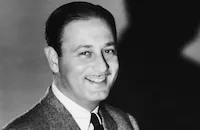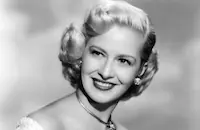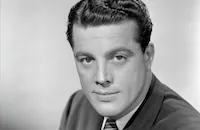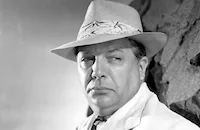Race Street

Brief Synopsis
Cast & Crew
Edwin L. Marin
George Raft
William Bendix
Marilyn Maxwell
Frank Faylen
Henry Morgan
Film Details
Technical Specs

Synopsis
When San Francisco bookmaker Hal Towers confides in his boss, racketeer Dan Gannin, that a syndicate is trying to force him to pay protection money, Dan reminds him about their recent pledge to get out of the gambling racket. Although Dan offers his best friend a chance to invest in his new, legitimate nightclub, Hal insists on fighting the syndicate. Dan cautions Hal, who is lame, to be careful, but before the night is over, Dan and another childhood friend, police detective Barney Runson, find the bookie lying dead at the bottom of his apartment stairs. Concerned for his friend's safety, Barney warns Dan not to seek vengeance on Hal's killers, but allow the law to pursue justice. Dan's associates, however, expect him to retaliate for Hal's murder, and Dan obeys the rules of gangster protocol by not revealing anything about the case to Barney. When Dan goes home that night, he is greeted by two well-dressed men who present themselves as "insurance salesmen." Anxious to discover who is behind the syndicate, Dan agrees to consider their protection offer, but the next day, the men see Barney at Dan's office and, assuming he is talking to the police, leave in a huff. Once again, Dan refuses Barney's request for information, and later criticizes his girl friend, Robbie Lawrence, for nagging him about being careful. After dropping Robbie home that night, Dan is accosted by two thugs, who blindfold him and take him to see their boss. Without revealing his identity, the boss gives Dan another chance to join the syndicate, but Dan refuses. Unaware that Robbie is sitting in the room with the boss, Dan is then beaten up by the thugs. After Barney has Dan released from the hospital, he questions Robbie at her apartment and comments that her face looks familiar to him. Dan then advises his bookmakers not to fight the syndicate, but allow him to take care of the problem. The next day, Dan's sister Elaine, a singer at his nightclub, begs Dan to stop his crusade, but he insists on finding Hal's killer. Unable to convince Dan to cooperate with him, Barney takes him to an old vaudeville theater and shows him a photograph of Robbie, a former showgirl, with husband Phil Dixon, the syndicate boss. Although Robbie, who told Dan she was a war widow, insists that she hasn't seen Dixon in years, Dan knows she is lying as he had smelled her perfume in Dixon's office the previous night. When confronted with the truth, Robbie confesses her deception but insists that Dixon forced her to betray him. Then, pledging her love to Dan, she agrees to leave San Francisco with him that night. As Dan is leaving Robbie's apartment, however, he overhears the desk clerk relaying a telephone call from her to Dixon and eavesdrops on the conversation. Now sure of Robbie's double-cross, Dan returns home, where he is put under protective custody by Barney. As Barney and Dan are leaving, Al, one of Dan's bookies, stops them at gunpoint and declares his allegiance to the syndicate. Dixon then arrives and is about to take Dan and Barney away when Dan instigates a fight. During the mêlée, Dan intercepts a bullet meant for Barney, who then knocks out Dixon. After Barney acknowledges his friend's sacrifice, Dan dies in his arms.

Director

Edwin L. Marin
Cast

George Raft

William Bendix

Marilyn Maxwell
Frank Faylen

Henry Morgan

Gale Robbins
Cully Richards
Mack Gray

Russell Hicks
Richard Powers
William Forrest
Jim Nolan
George Turner

Richard Benedict
Dean White

Freddie Steele
Sam Mcdaniel
Hercules Mendez
Carl Saxe
Reginald Billado

Steven Flagg
Wong Artarne
Mickey Martin
Edna Ryan
Charmienne Harker
Joan Myles
George Goodman
Oliver Cross
Frank Scannell
Jane Woland
George Chandler
Michael Wallace
Al Rhein
Robert Dudley

Charles Lane

Cy Kendall
James Bush
Al Murphy
Barry Brooks
Mary Kent
Mike Lally
Eddie Arden
Franklyn Farnum
June Terry Pickrell
George Murray
Crew
C. Bakaleinikoff
Gordon Bau
Samuel E. Beetley
Russell A. Cully
Albert S. D'agostino
Gene Depaul
Jack J. Gross
Ray Heindorf
Nat Holt
J. Roy Hunt
Moe Jerome
Walter E. Keller
Terry Kellum
Ted Koehler
Charles O'curran
Martin Rackin
Don Raye
Grayson Rogers
Dore Schary
Darrell Silvera
Jean L. Speak
William Stevens
Edward Stevenson
Roy Webb

Videos
Movie Clip




Film Details
Technical Specs

Articles
Race Street
Based on a serialized story of the same title by Maurice Davis that originally appeared in Turf and Sport Digest in the mid-1940s, Race Street was familiar territory for George Raft who had made a career out of playing tough guys in the 1930s and 40s. The film came during a period where Raft's career was on the decline. While still popular, Raft was now in his 50s and was no longer the box office draw that he had once been.
Race Street may be typical of the mediocre crime dramas Raft made during the late forties and beyond but it has its points of interest. Marilyn Maxwell, usually a blonde, is a brunette here which turns out to be one of the film's red herrings. Frank Faylen, best known for his role on the TV series, The Many Loves of Dobie Gillis [1959-1963], makes a particularly vicious villain, and one just as sadistic as the male orderly he played in The Lost Weekend [1945]. The cinematography, courtesy of cameraman J. Roy Hunt (The Devil Thumbs a Ride [1947], Crossfire [1947]), is often quite striking, conveying a film noir mood of impending doom. The other points of interest, especially if you have an interest in San Francisco's past, are the evocative glimpses of the city circa 1948 The RKO Golden Palace theatre (it has since been renovated as a performing arts center), The Owl Drug Co. (long since replaced by The Gap), The Cliff House, and the Fairmont Hotel (showcased in many films, especially Hitchcock's Vertigo).
Producer: Nat Holt
Director: Edwin L. Marin
Screenplay: Martin Rackin; Maurice Davis (story)
Cinematography: J. Roy Hunt
Art Direction: Albert S. D'Agostino, Walter E. Keller
Music: Roy Webb
Film Editing: Sam E. Beetley
Cast: George Raft (Daniel J. 'Dan' Gannin), William Bendix (Lt. Barney Runson), Marilyn Maxwell (Robbie Lawrence), Frank Faylen (Phil Dickson), Henry Morgan (Hal Towers), Gale Robbins (Elaine Gannin), Cully Richards (Mike Hadley), Mack Gray (Stringy), Russell Hicks (Easy Mason), Richard Powers (Al), William Forrest (Nick Walters), Jim Nolan (Herbie), George Turner (Dixie), Richard Benedict (Sam), Dean White (Big Jack)
BW-79m.
by Andrea Passafiume

Race Street
Quotes
Trivia
Notes
After production on this picture was completed, Hollywood Reporter announced that the title was being changed from Race Street to Jackpot. By the time of the picture's release, however, the title had been changed back to Race Street. According to Hollywood Reporter, William Henry tested for the "heavy" role. Some scenes in the picture were shot in San Francisco, according to Hollywood Reporter.














